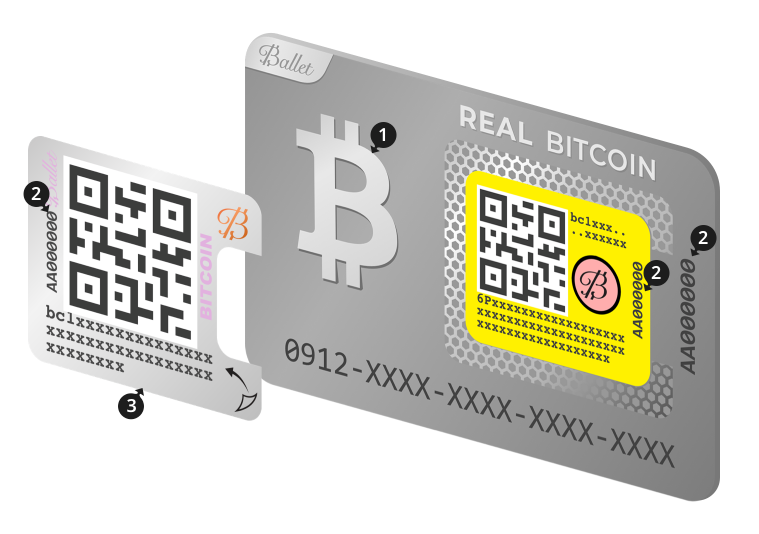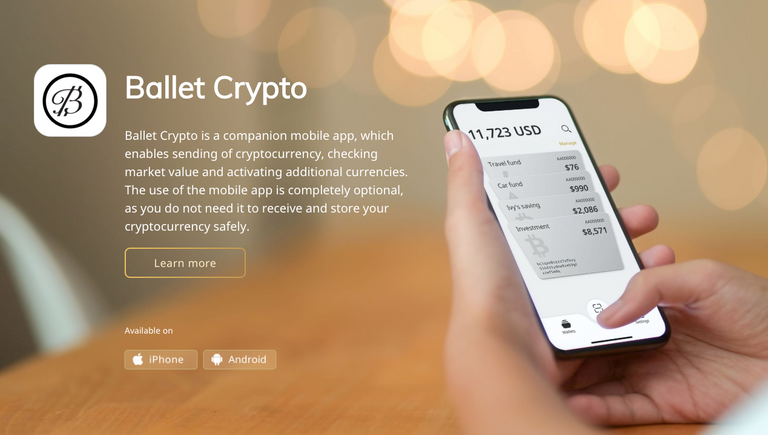Ballet - The Hardware Wallet for the Masses?

Bobby Lee is a long-time crypto investor and entrepreneur. He is famously known as the co-founder and former CEO of one of the oldest bitcoin exchanges - BTCC. BTCC was sold shortly after the ban on ICOs and fiat-to-crypto transactions in China.
I've been messing around with hardware wallets ever since I first landed in crypto a little over 3 years ago. Hardware wallets have seen many iterations and different companies have jumped in to try and create their "hardware wallet for the masses".
The majority of my experience with hardware wallets has been with the original Trezor and the Ledger Nano S. Since getting into Steem, my perspective and usage of hardware wallets has changed dramatically.
While I like the idea of a hardware wallet -- securing your crypto with a pocket-sized device that is guarded by a passcode and backed up by a secure passphrase -- I still find them troublesome and hard to use.
For the average tech geek, hardware wallets are relatively easy to use. For the masses however, this is a burden that most are unlikely to ever put upon their shoulders.
Enter Ballet.

Announced Thursday at CoinDesk’s Invest: Asia event in Singapore, Lee’s new venture, Ballet, is rolling out a hardware wallet supporting multiple cryptocurrencies.
Ballet is Bobby Lee's latest creation and his idea of what a hardware wallet for the masses would look like.
Starting at just $29, this is one of the cheapest hardware wallets out there. Compare this price to the Trezor ($59 - $159) and the Ledger ($59 - $119).
Ok, so we've got a nice and cheap price. Something that the masses may actually consider for securing their money. Usability of this device is still the core issue:
To differentiate its product and spur adoption outside crypto circles, Ballet will generate public addresses and private keys for users in advance.
There is support for several of the major cryptocurrencies. This is pretty standard as far as hardware wallets are concerned and should cover the vast majority of potential users. Other wallets have the capability to store a wider variety of cryptocurrencies, but remember -- this is supposed to be a hardware wallet for the masses. Simplicity is key.

“We generated the keys for you in two locations thousands of miles apart,” he said. “[After that] we manufacture ourselves out of the process.” - Bobby Lee
From what I gather, the process looks something like this:
- The product is manufactured in one facility
- The private keys are generated in another facility
- They are linked up to the "master key a.k.a. master passphrase" on the wallet and those 4 keys are subsequently destroyed
- The wallet is then shipped to you
The device is metal and the size of a credit card, making it a somewhat familiar look and feel to what the masses are currently used to. It links up to their Android and IOS apps. Using the app in conjunction with the hardware is what actually allows the user to see their private key.
Could This Actually Be the Wallet For the Masses?
I'm not entirely sold that this could be the next big leap for cryptocurrency adoption. Sure, it's got a simple and cool design, its cheap and it seems to have the core features that your average person would need to store and transact their crypto but I still see a lot of room for confusion.
Until I get my hands on this device (yes, I'll be pre-ordering one and will do a hands-on review of it), I still have a lot of questions as far as user experience, educating the masses and security of their facilities in handling the generation (and subsequent destruction) of private keys.
(1) Quotes Source - Coindesk
(2) Images From Ballet's Official Website
To listen to the audio version of this article click on the play image.

Brought to you by @tts. If you find it useful please consider upvoting this reply.
@khaleelkazi, At this moment no project or application can bring masses towards Cryptocurrency all alone but this Wallet is reflecting cool one. Thank you for letting me know.
Posted using Partiko Android
I think most cryptos suck. LEO seems pretty "decent" though. lol
Feel free to help take out some of the few remaining sellers. :)
https://steem-engine.com/?p=market&t=LEO
😁😁
Posted using Partiko Android
I’m not impressed after looking at the vendor’s site. You can receive all you want, but to send coin you have to peel off a sticker to reveal the private key and scratch off the film protecting the pass phrase. This makes it essentially a cold storage wallet only, no better than a paper wallet you can print on your own for the cost of a sheet of paper and some ink! And like a paper wallet, it isn’t even fireproof. Also, to send coin, you have to use a phone app, no different than the several free apps I already have. If you want a card with only your receive (public) key, you can print business cards at home with the QR code on it, also much cheaper.
So no, I’m not impressed.
@khaleelkazi: For the record, I should have been clear in my reply: this post was very good, that it is the product reviewed that is lacking. I try to distinguish between the author’s work and the topic of the post, but did not do that this time. My bad.
Hi, @khaleelkazi!
You just got a 13.64% upvote from SteemPlus!
To get higher upvotes, earn more SteemPlus Points (SPP). On your Steemit wallet, check your SPP balance and click on "How to earn SPP?" to find out all the ways to earn.
If you're not using SteemPlus yet, please check our last posts in here to see the many ways in which SteemPlus can improve your Steem experience on Steemit and Busy.
FYI LEO had a good day in the markets today. I think tomorrow will be even better. lol
https://www.steemleo.com/leo/@mysearchisover/mysearchisover-the-leo-the-lion-trader-1-615
seem is a good Wallet.